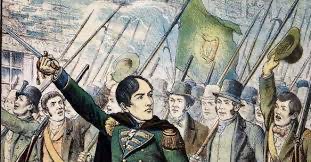On this day, 220 years ago, a 25-year-old Irish republican Robert Emmet was taken from his cell in Kilmainham Jail and sent to die at a gallows erected on Thomas Street. The public execution, intended by the British administration in Ireland to set an example for the rebellious populous. Many flocked to see the man who had attempted to stage rising in Dublin two months prior. Emmet, denied permission to give a speech to the large crowd for fear of the power of his words, could only say: “My friends, I die in peace and with sentiments of universal love and kindness towards all men.” Reporters, even those viruently opposed to Emmet and his revolutionary ideals, commented on Emmet’s fearlessness in death. According to one story of his bravery, Emmet helped his executioner place the noose around his neck. Robert Emmet was hanged from the gallows that day.
His body was then taken from the scaffold and beheaded. The selflessness, fearlessness, and patriotism displayed by Emmet at both his murder and his trial became a rallying cry to the Irish republican movement which had still been reeling from the brutal suppression of the 1798 rising. It captured the imagination of both the Irish public and their colonial overlords. William Wickham, then the British administration’s Chief Secretary for Ireland, was haunted by Emmet’s sacrifice and wrecked by guilt for his role in his death, famously resigning from his post as a result. The martyrdom of a selfless hero can inspire the deepest and most personal thoughts and feelings of people to surface. For the Irish people and for Irish republicans today, Emmet’s story is an inspirational story of a young man who gave his life to keep the flame of resistance lit.
Born in 1778 to a family of the Protestant ascendancy in Dublin, Emmet’s family were friends of Wolfe Tone and the founders of the United Irishmen. While studying history in Trinity College, he was a fierce debater in its historical society, and became the secretary of a secret society in support of the United Irishmen. He was expelled from Trinity as a result in 1798. Later that year, he played a key role as an emissary in the executive reconstructing the United Irishmen, travelling across England and France to find support for Irish national liberation among English radicals and the French government, meeting Napoleon. With once-radical France now hijacked by reactionaries, Emmet understood that the Irish people could only rely on themselves for liberation. Upon returning to Dublin, Emmet made plans with Anne Devlin and the guerrilla leader Michael Dwyer, along with Thomas Cloney, for revolutionary rising in Dublin in 1803.
Emmet issued the Proclamation of the Irish Republic, which declared that:
“We therefore solemnly declare, that our object is to establish a free and independent republic in Ireland: that the pursuit of this object we will relinquish only with our lives: that we will never, unless at the express call of our country, abandon our post, until the acknowledgement of its independence is obtained from England; and that we will enter into no negotiation (but for exchange of prisoners) with the government of that country while a British army remains in Ireland.”
After assembling a small arsenal of pikes, muskets, and pistols, Emmet’s 1803 Rising in Dublin was launched on the 23rd of July at Thomas Street. The plan was for the rebels to seize Dublin Castle, disguised in a convoy of aristocratic carriages. However, when fewer men than expected arrived and reinforcements stalled, along with the loss of the carriages, the rising attempt became abortive. Those who had showed up, no more than 80, were disorderly and some had reportedly been drinking. With the absence of volunteers from Kildare who had turned back, Emmet’s plan had become a military impossibility. Believing that the rising was doomed and attempting to stand down his men to avoid needless bloodshed, Emmet was forced to flee to Rathfarnham. Fighting in the streets of Dublin would continue into the night, before the remnants of the rising were bloodily suppressed.
Robert Emmet went into hiding before being arrested at Harold’s Cross on the 25th of August. The lawyer on his defence at his trial on the 19th of September was Leonard McNally, a traitor to the United Irishmen who, unbeknownst to Emmet, had been paid off by the British government to spy on and sabotage their efforts. The British government naturally paid McNally to lose Emmet’s legal case, meaning that Emmet’s mock trial had been decided from the beginning. The rat McNally had done the same at the trial of Wolfe Tone. The jury found Emmet guilty of treason, and he was sentenced to be hung, drawn, and quartered. Standing alone and speaking on the behalf of his nation in the face of a merciless oppressor, the only man who could defend himself was Emmet, who delivered his famous speech from the dock while Judge Norbury begged him to stop. When Norbury told him that “You have endeavoured to establish a wicked and bloody provisional government,” Emmet responded that:
“What, my lord! shall you tell me, on the passage to the scaffold, which that tyranny, of which you are only the intermediary executioner, has erected for my murder, that I am accountable for all the blood that has been and will be shed in this struggle of the oppressed against the oppressor?”
Emmet continued:
“Let no man dare, when I am dead, to charge me with dishonour; let no man attaint my memory by believing that I could have engaged in any cause but that of my country’s liberty and independence; or that I could have become the pliant minion of power in the oppression and misery of my countrymen. The proclamation of the Provisional Government speaks for my views; no inference can be tortured from it to countenance barbarity or debasement at home, or subjection, humiliation, or treachery from abroad. I would not have submitted to a foreign oppressor, for the same reason that I would resist the domestic tyrant. In the dignity of freedom, I would have fought upon the threshold of my country, and its enemy should only enter by passing over my lifeless corpse.”
Anti-Imperialist Action Ireland and the entirety of the Socialist Republican movement remember Robert Emmet for his sacrifice and exemplary courage. We work to stand firmly in his tradition of self-determination, democracy, self-sacrifice, and justice.

